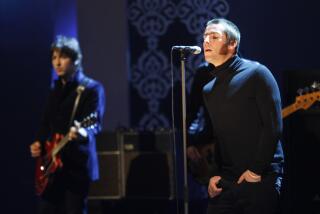Sorry, Kids. Mom and Dad Spent Your Allowance on Concerts
- Share via
Baby boomers still rule in pop music, at least when it comes to concert ticket sales.
The record industry may depend to a large degree on rock and hip-hop acts that can connect with teens and twentysomethings, but it’s the parents of those record buyers who apparently continue to drive the concert industry, if the early returns on upcoming tours by the Rolling Stones and Fleetwood Mac are any indication.
The 36-date Fleetwood Mac tour--which kicks off Wednesday in Hartford, Conn., and includes shows Oct. 17 to 19 at Irvine Meadows Amphitheatre and Oct. 24 at the Hollywood Bowl--is virtually sold out, with brokers in Los Angeles asking up to $700 for the best seats.
And ticket demand for the 32-city North American leg of the Stones’ tour, which launches Sept. 23 in Chicago and reaches Dodger Stadium on Nov. 9, is also high. Though tickets for the Dodger Stadium show have yet to be put on sale, brokers say the best seats will fetch as much as $750.
“These tours are a very healthy addition to the concert calendar after a somewhat questionable summer,” says Jane Cohen, editor in chief of Performance magazine, which tracks the concert industry.
The industry had been waiting anxiously for early results on the tours because of questions about the vitality of the concert market after U2’s “PopMart” tour this year proved to be less than the knockout expected.
Though the tour, which continues in Europe through the end of the month before resuming in North America Oct. 26 and 27 in Toronto, has grossed a whopping $150 million, the Irish band played before empty seats in some venues, and its hopes of creating enough demand to add second shows in selected cities didn’t materialize.
Though the early indications about the Stones and Fleetwood Mac are encouraging to promoters around the country, some observers worry about the possible danger down the road as the industry’s most consistent draws move into their twilight years.
“What the industry is in dire need of is new blood to take the place of the Rolling Stones and the Fleetwood Macs and the Pink Floyds,” Cohen says. “Who’s going to replace them? Are the Stones going to be touring when they’re in their 60s?
“Of course, we probably posed a similar question when they were in their 30s and 40s, and here they are in their 50s. But the problem is, there are no new Rolling Stones or Fleetwood Macs being nurtured out there.”
Indeed, Bush was the only Gen X act among the Top 10 in Pollstar magazine’s midyear list of the year’s top-grossing tours, a list that was dotted with such veterans as Phil Collins, Jimmy Buffett, Tina Turner, Metallica and KISS.
Gary Bongiovanni, editor in chief of Pollstar, has yet to decide whether the success of the Fleetwood Mac and Stones tours, while lining the pockets of the performers and promoters, will be a boon to the industry as a whole.
“There are two conflicting theories on that,” he said. “One is that when an act like the Stones sells tickets that are relatively expensive, they’re taking money from [a pot] that would have gone to other shows. But then there are others who think these kinds of shows make going to concerts in vogue again and actually help sell tickets to other shows.”
Though the success in recent years of the Eagles and their contemporaries might suggest otherwise, not all the veteran acts still touring are consistent draws.
The Who, for instance, played to less than 60% of capacity at several arena shows this summer.
That’s why the intense interest in the Fleetwood Mac reunion caught some analysts by surprise.
“That’s one of the most interesting things about the concert business: You never really know until you put things out on sale and let the public decide,” Bongiovanni says. “We don’t work with a lot of market research.”
More to Read
The biggest entertainment stories
Get our big stories about Hollywood, film, television, music, arts, culture and more right in your inbox as soon as they publish.
You may occasionally receive promotional content from the Los Angeles Times.










